You are a celebrity. Strangers shove cameras in your face, journalists make up lies about you, and mental health is at an all time low. Money may make up for it in terms of materialism, but your life will never be normal again.
You are expected to always perform. There are no days off. After all, you have a reputation to uphold. Otherwise, your agent will have some choice words with you.
You are left alone. You will always be alone with your thoughts, alone with your turmoil, and alone with your demons—you will always be forced to face your demons.
Smile 2 knows exactly what it’s doing exploring the horrors of pop star fame. Serving as a sequel to the 2022 film Smile, this installment attaches the demon to a world-famous pop star, but while the demon still feeds on trauma, the message of the movie is drastically changed. It’s no longer just about mental health—it’s about the industry’s dehumanization of its stars.
YOU WILL PERFORM AND BE HAPPY
Smile 2 doesn’t shy away from its attacks on the entertainment industry. Skye Riley acts as our uber famous protagonist—think on the same levels as Britney Spears, Ariana Grande, or Madonna—who is preparing to go on her massive comeback tour after a hiatus.
The hiatus wasn’t just a break for a vacation; Skye was in a serious car accident that she survived, but her boyfriend didn’t. Suffering from serious back pain, Skye forces herself to go back to work, attempting to ignore her physical and mental pains.
Despite her pain, Skye must go back to performing. She has contracts she needs to fulfill, fans she must appease, and management she must keep paid. The comeback tour isn’t for Skye, it’s for the world to remember she’s still relevant before the next big pop star comes along and steals her thunder. Unfortunately for Skye, like many pop stars before her, it means feeling the weight of expectation: she must smile, she must perform, and she must prove she’s still worthy of her position.
The more we watch Skye rehearse and deal with the pressures of her team, the more similar it feels to real-world pop stars. Perhaps one of the most obvious to come to mind is the amazing Britney Spears, who had to prove herself time and time again at the height of her frame. Specifically, Skye’s rehearsal is reminiscent of Britney’s 2007 VMAs performance.
In Britney’s memoir, The Woman in Me, she reveals that she was having a panic attack before going on stage. She pushed through, of course, but her performance was highly criticized. The reality is that Britney hadn’t slept the night before, she hated the way she looked, and she had run into Justin Timberlake backstage of all people. Her mental health wasn’t exactly great at this time, and you could see the lack of enthusiasm in her eyes during the performance.
In her memoir, she wrote: “I'm not going to defend that performance or say it was good, but I will say that as performers we all have bad nights.”
Similarly, Skye Riley is forced to live through these same cycles. It doesn’t matter she had suffered from drug addiction. It doesn’t matter that she has intense back pain from a car wreck. It certainly doesn’t matter that her mental health has gone to shit—what matters is that she’s a pop star and she must perform. The world doesn’t care about her suffering; they care about the show.
Skye doesn’t have a choice. She belongs to the industry… and the demon.
SMILE AND SAVE YOUR TEARS
If Skye Riley was featured on any album, it would be The Weeknd’s After Hours. Meant to build a surreal horror world, the album also tells the story of a performer trapped in a cycle of self-destruction, forced to smile through the pain. Starting to make sense now?
Throughout After Hours, The Weeknd’s character is constantly in pain, whether it be mentally or physically. Yet, he keeps smiling—performing for the crowds, even as he’s beaten and bloodied. Just like Skye, he must ignore his pain and keep performing for everybody.
To cope, he drowns himself in drugs, alcohol, and empty excess. Despite the neon lights of Vegas, his story is shrouded in the darkness of the music industry. He must keep moving, performing, and smiling. He has no control of what comes next.
Skye is the perfect example. In her story, the demon is in control, acting as the personification of the industry. She clings to coping mechanisms, but no bottle of Voss water will ever be enough to wash away the industry’s grip.
These characters aren’t just there to perform, they’re there to act as props. Skye must look perfect 24/7 to achieve the best comeback ever. It’s the same concept seen in the “Save Your Tears” music video, where The Weeknd has been surgically altered to meet the demands of the industry’s want for perfectionism.
There is no Abel Tesfaye anymore—there is only The Weeknd.
It’s the perfect connection to Skye’s parasitic relationship with the demon, who uses her as a puppet for its bidding. She may still be standing, still singing, still smiling. But the truth is, Skye Riley is already gone. The demon had already decided her fate a long time ago.
THE FINAL ACT
The end of Smile 2 has Skye Riley take stage for the opening night of her comeback tour. The audience erupts in cheers, seeing only their beloved icon. They don’t see the pain, the suffering, the torture. They see perfection. And they expect a perfect performance too.
But Skye does not perform.
Instead, she is overtaken by the demon, possessed by its power. Skye Riley is another victim of the demon, yes, but she’s also another victim of the industry. While she’s being consumed by the demon, it goes unnoticed by the audience.
It isn’t until she begins to convulse on stage that her fans worry. They whisper to each other, yell at someone to help her, clutch their phone in concern. Something was wrong, after all.
Then, Skye stands back up with a smile. She’s fine – the audience is fine.
But the reality is that Skye is gone.
The demon uses her body as a puppet, making her perform its bidding. Skye Riley succumbs, killing herself on stage in front of thousands of fans.
This isn’t just horror fiction… we’ve seen this before.
Remember Britney in 2007? The infamous meltdown—the one the media mocked for years. It was an awful, horrible thing to happen to a young woman. She may not have been haunted by a smile demon, but she certainly was haunted.
Haunted by the paparazzi.
Haunted the tabloids.
Haunted by the industry.
She shaved her head to feel in control. She bashed a paparazzi’s car because she was desperate.
But nobody cared when she hid her suffering, they only cared when she snapped.
Just like Skye Riley, she lost herself because of an industry that wouldn’t let her breathe.
But it wasn’t just Britney who had to reflect on this cycle.
The Weeknd turned to horror to create his own story, a musical surrealist experience of fame.
After Hours is about a performer suffering under pressure from fame, yet he’s forced to keep smiling.
The short film is where everything unravels.
The key point of the film comes when The Weeknd suffers from a mental breakdown. He stumbles, becoming fully consumed by the horrors. He doesn’t know what’s real anymore. He steps into an elevator.
There’s no longer a smile. He refuses to perform anymore.
It’s implied that he turns to violence, ready to murder the couple the gets on the elevator with him. Well… what happens when an artist breaks?
They lash out. They self-destruct. They lose themselves.
CONCLUSION
What can we take from all this?
Skye’s fate was already determined when she stepped on stage. Britney’s freedom was taken from her when she released “…Baby One More Time.” The Weeknd lost himself as soon as he walked into the elevator.
But none of these stories matter. They are only a fraction of the industry’s shady practices, going from artist to artist as they fall like dominos. This is a machine, a cycle needed for the industry to build wealth and power.
It isn’t about the artists.
It’s about us.
Smile 2 was never about the demon. It was about the industry.







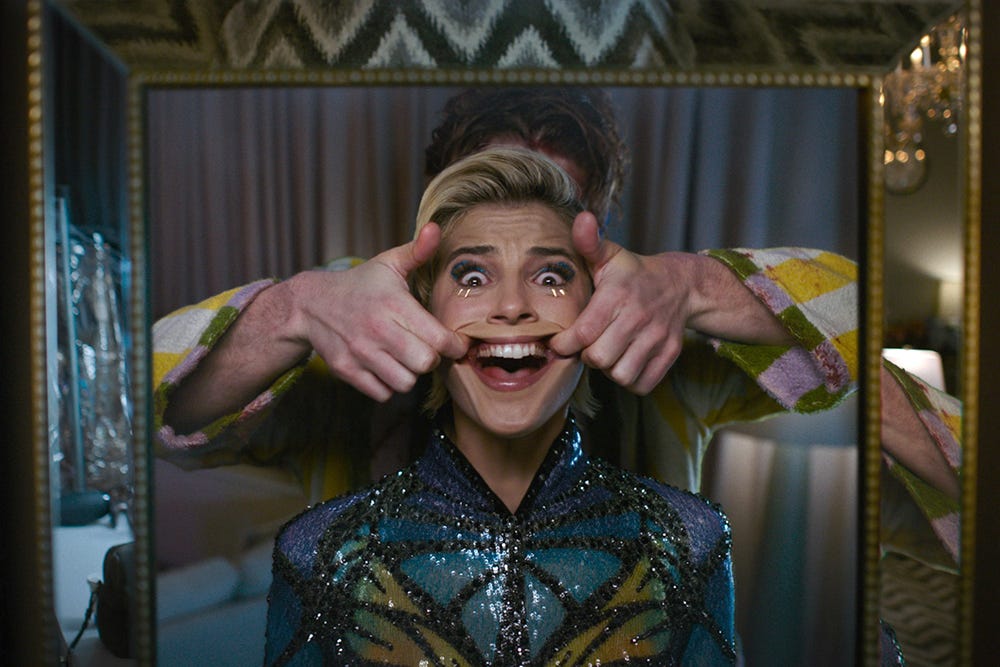
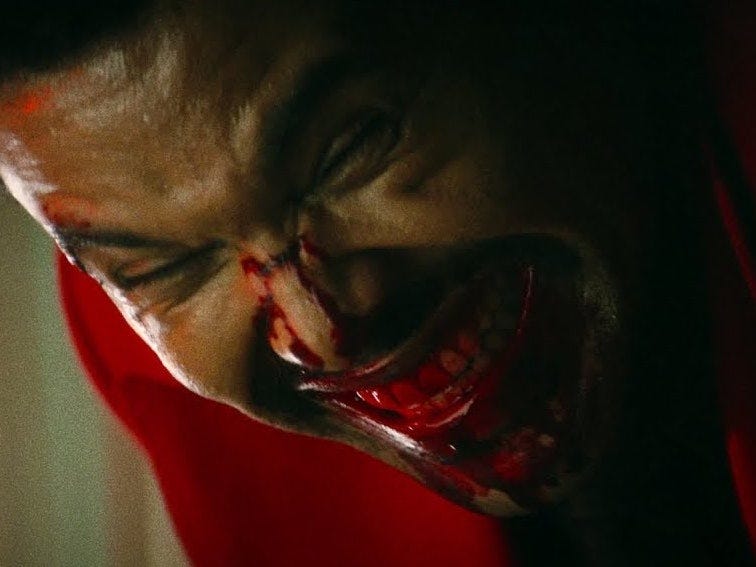
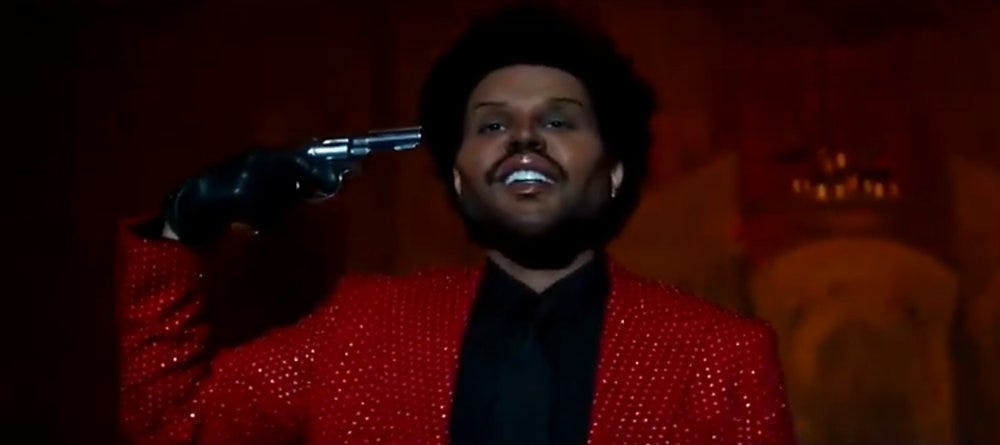
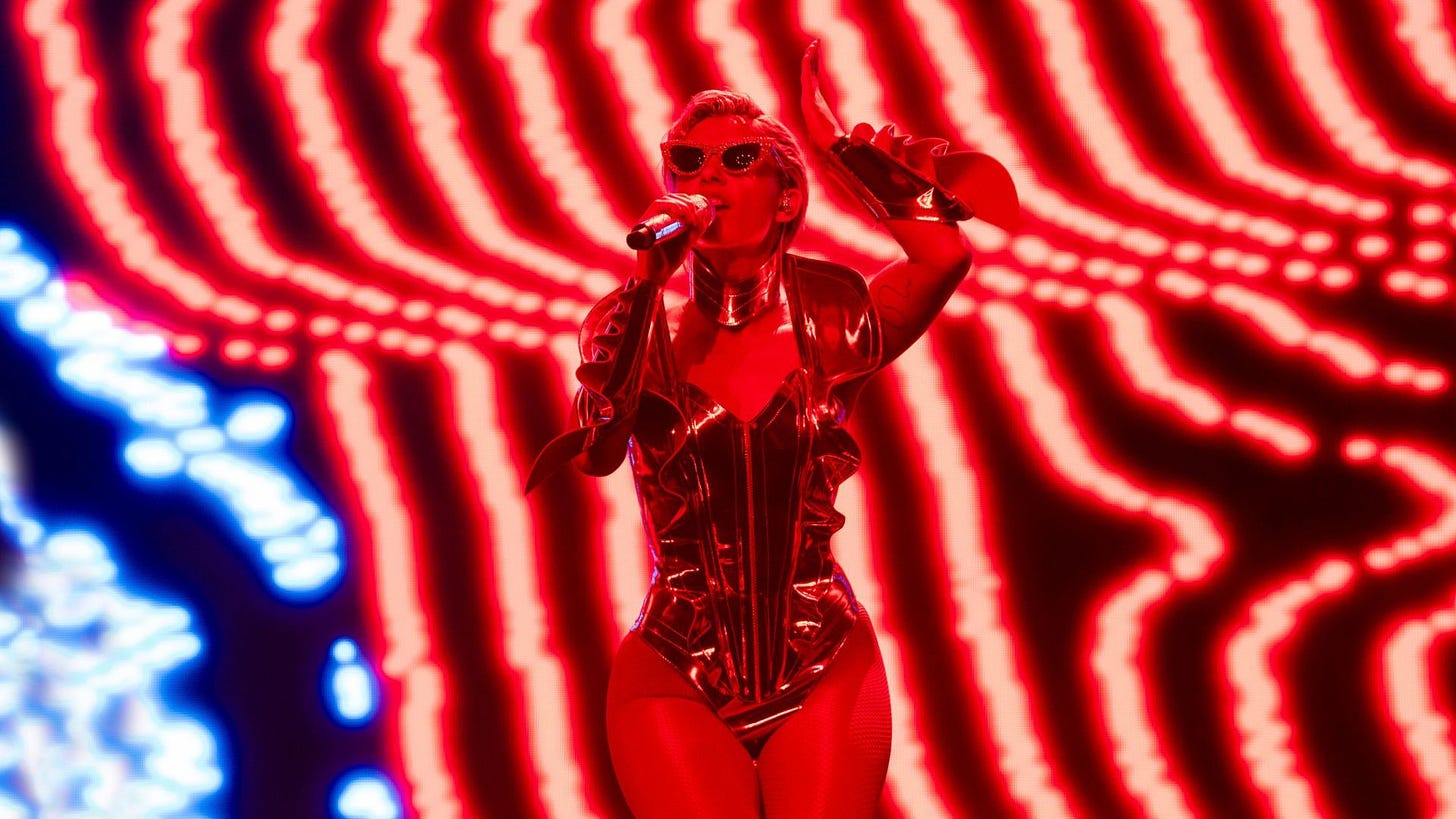
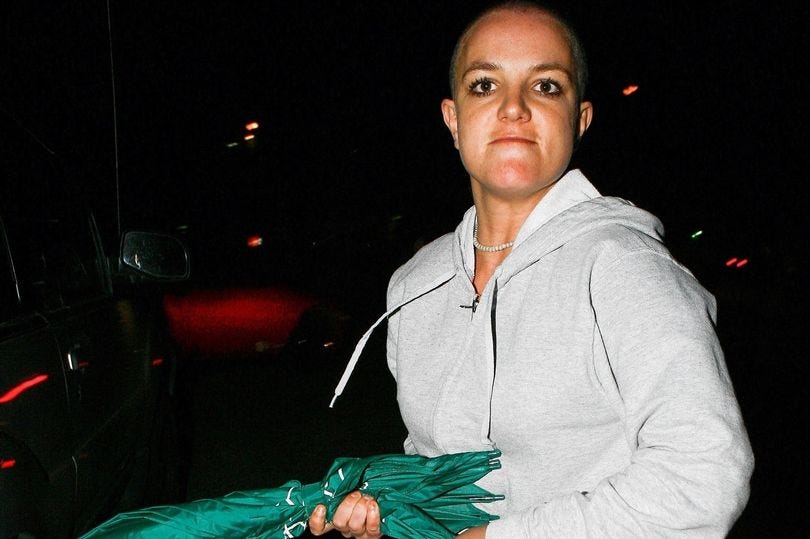
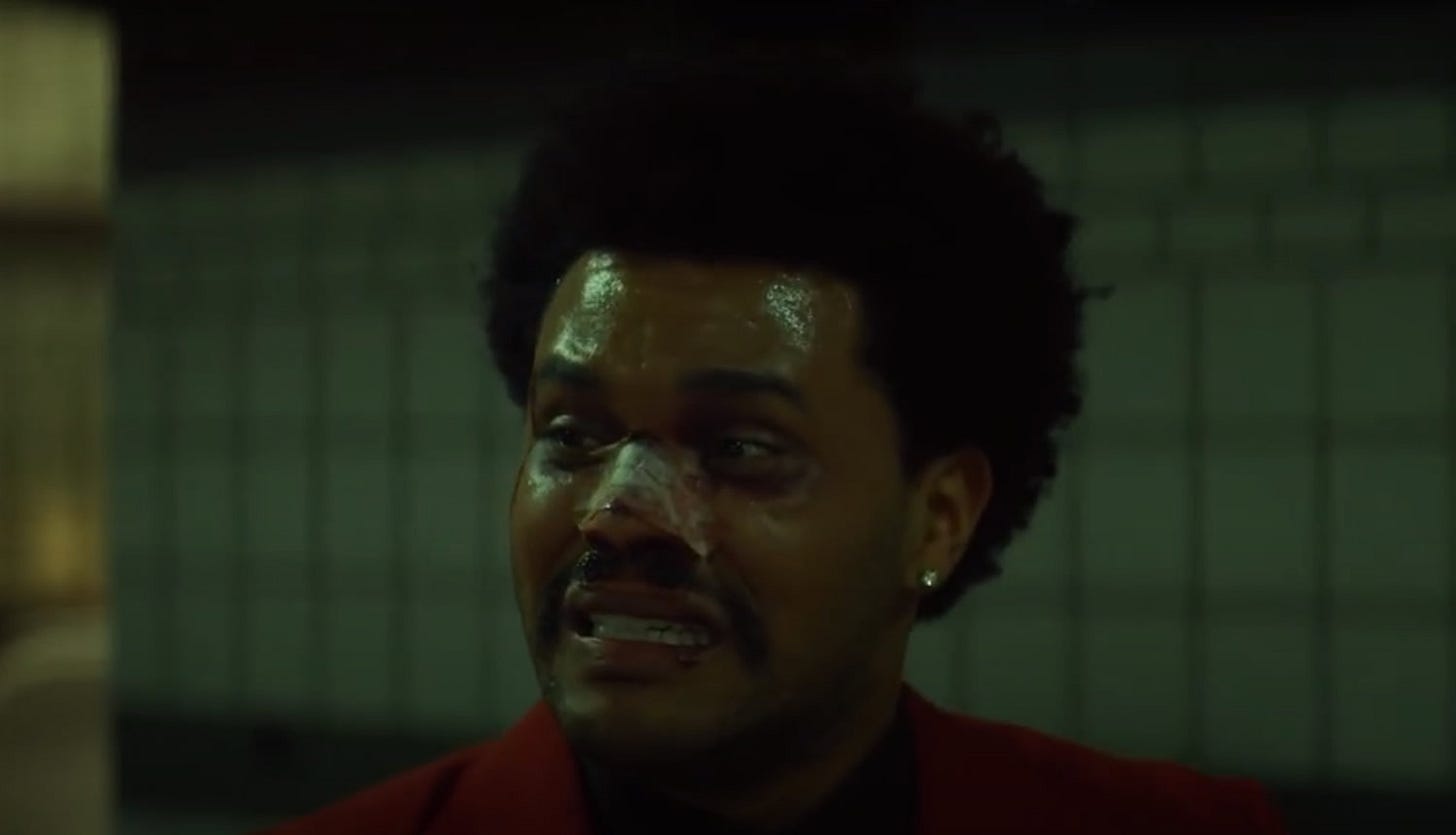

Very well-crafted and insightful post, Skyla!
Very cool post